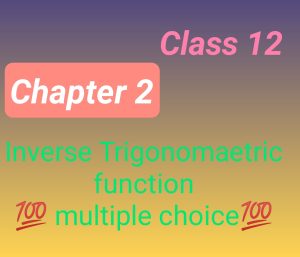Multiple choice (Continuity and differentiability)
Choose and write the correct option in the following question:(continuity and differentiability multiple choice)

1.) The function f:R → R given by f(x) = -|x – 1| is
(a) Continuous as well as differentiable at x = 1
(b) Not continuous but differentiable at x = 1
(c) Continuous but not differentiable at x = 1
(d) Neither continuous nor differentiable at x = 1
Answer (c)
2.) The function ![]() is
is
(a) Continuous everywhere but not differentiable at x = 1
(b) Continuous and differentiable everywhere
(c) Not continuous at x= 0
(d) None of these
Answer (a)
3.) The function f(x) = [x], where [x] denotes the greatest integer function, is continuous at
(a) 4 (b) 2
(c) 1 (d) None of these
Answer (d)
4.) The number of points at which the function ![]() is not continuous is
is not continuous is
(a) 1 (b) 2
(c) 3 (d) None of these
Answer (d)
5.) The function ![]() is continuous at x = 0 then the value of k is
is continuous at x = 0 then the value of k is
(a) 3 (b) 2
(c) 1 (d) 1.5
Answer (b)
6.) If the function f defined by ![]() , is continuous at x =π/2, then the value of
, is continuous at x =π/2, then the value of
(a) 2 (b) 3
(c) 6 (d) -6
Answer (c)
7.) The function f(x) = cot x is discontinuous on the set
(a) {x = nπ: n∈ Z} (b) {x = 2nπ: n∈ Z}
(c) {x = (2nπ+1)π/2: n∈ Z} (d) {x = nπ/2: n∈ Z}
Answer (a)
8.)Let f(x) = |sin x|. then
(a) f is everywhere differentiable.
(b) f is everywhere continuous but not differentiable at x = nπ: n∈Z
(c) f is everywhere continuous but not differentiable at x =(2n + 1)π/2, n∈ Z.
(d) None of these
Answer (b)
9.) The function ![]() is discontinuous at
is discontinuous at
(a) Exactly one point (b) Exactly two points
(c) Exactly three points (d) No point
Answer (c)
10.) If ![]() , where x ≠ 0, thenthe value of the function f at x = 0, so that the function is
, where x ≠ 0, thenthe value of the function f at x = 0, so that the function is
(a) 0 (b) -1
(c) 1 (d) None of these
Answer (a)
11.) The function ![]() is continuous at x = 0 for the value of k, as
is continuous at x = 0 for the value of k, as
(a) 3 (b) 5
(c) 2 (d) 8
Answer (d)
12.) If ![]() , then which of the following question is true ?
, then which of the following question is true ?
(a) ![]()
(b) ![]()
(c) ![]()
(d) ![]()
Answer (b)
13.) Differential of ![]() w.r.t. , is
w.r.t. , is
(a) ![]() (b)
(b) ![]()
(c) ![]() (d)
(d) ![]()
Answer (a)
14.) If ![]() , then
, then ![]() is
is
(a) ![]() (b)
(b) ![]()
(c) ![]() (d)
(d) ![]()
Answer (a)
15.) If ![]() , then
, then ![]() is
is
(a) ![]()
(b) ![]()
(c) ![]()
(d) ![]()
Answer (c)
16.) The set of points where the functions f given by f(x) = |x – 3| cos x is differentiable is
(a) R (b) R – {3}
(c) (0, ∞) (d) None of these
Answer (b)
17.) Differential coefficient of ![]() w.r.t. x is
w.r.t. x is
(a) ![]() (b)
(b) ![]()
(c) ![]() (d)
(d) ![]()
Answer (a)
18.) If ![]() and
and ![]() , then
, then ![]() is
is
(a) 1/2 (b) x
(c) ![]() (d) 1
(d) 1
Answer (d)
19.) If ![]() , then the value of
, then the value of ![]() at x = π/4 is
at x = π/4 is
(a) 0 (b) 1
(c) 1/2 (d) ∞
Answer (b)
20.) If ![]() , then
, then ![]() is equal to
is equal to
(a) ![]() (b)
(b) ![]()
(c) ![]() (d)
(d) ![]()
Answer (a)



